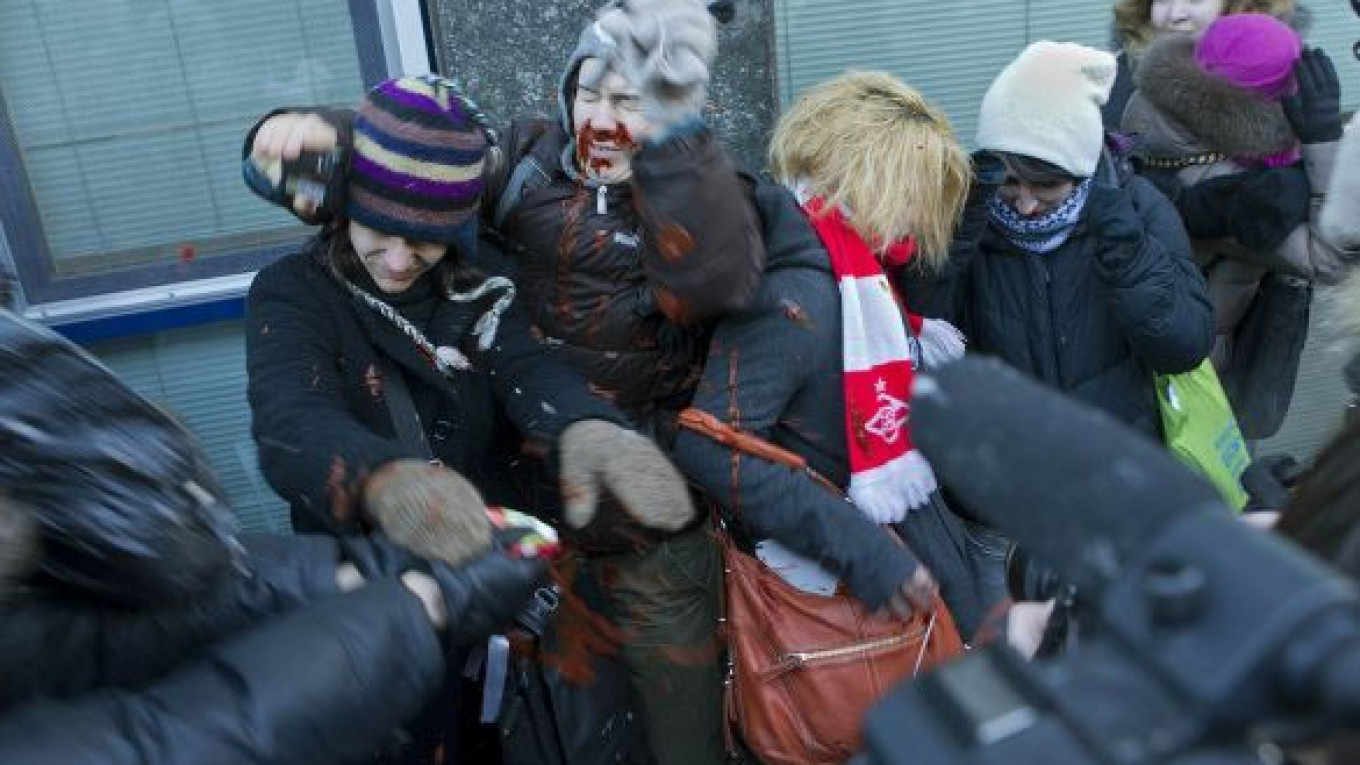The brutal killing of a gay man in the southern city of Volgograd has sparked outrage among Russia's LGBT community, with activists calling authorities "accomplices" in the killing for stigmatizing sexual minorities.
The body of the 23-year-old man was found early Friday morning in the courtyard of an apartment building on Rossiiskaya Ulitsa in one of Volgograd's sprawling suburbs, investigators said in a statement.
The victim, identified by gay rights activists as Vladislav Tornovoi, was badly beaten and found with wounds to his genitals, the statement said. Local media reported that Tornovoi's attackers raped him with an empty beer bottle and set fire to his corpse.
Investigators believe that Tornovoi was attacked after coming out to his drinking companions during alcohol-fueled Victory Day celebrations.
Two local men — aged 22 and 27 — have been detained in connection with the killing and face up to 15 years in jail on murder charges. Another local has been questioned as a witness.
Gay rights activists say legislation criminalizing ‘homosexual propaganda’ and the state’s anti-gay stance are partly to blame.
Investigators rarely cite homophobia as a motive for killings, and Nikolai Alexeyev, a leading gay rights activist, speculated that they had only mentioned he was gay in order to downplay the significance of the gruesome death.
"By noting that the victim was gay, investigators wanted to portray him as someone abnormal and therefore expendable," he said by phone.
Alexeyev explained that homophobic attacks are common in Russia and that they are not classified as hate crimes under domestic law. Hate crimes, which include those motivated by racial, religious or ethnic bias, carry especially harsh punishments.
Russian authorities have been censured for a perceived crackdown on gay citizens in recent months, with foreign governments slamming laws passed by more than 10 regional legislatures that impose fines for promoting homosexuality among minors.
A federal bill criminalizing "homosexual propaganda" has overwhelmingly passed a first reading in the lower house and is soon to be heard in a crucial second reading.
"Political figures have provoked anti-gay sentiment by portraying the gay community as a bunch of freaks," Alexeyev said. "They are accomplices in the killing."
Nikolai Bayev, another prominent gay rights activist, explicitly blamed President Vladimir Putin, Patriarch Kirill and Yelena Mizulina, a key proponent of the federal bill, for Tornovoi's death in a strongly worded blog post published Sunday.
Bayev's post on the GayRussia.eu website began: "President Putin, crush the head of Vladislav Tornovoi! Strip him until he's naked. Brake his ribs, beat his face and shove a bottle up his anus. Kill him, he's just a gay."
Putin has denied that Russia discriminates against sexual minorities but criticized same-sex couples for failing to contribute to Russia's stagnant birth rate on an official visit to the Netherlands last month.
Gay rights activists are now considering whether to dedicate to Tornovoi a planned gay pride parade scheduled to take place in Moscow on May 25 to attract attention to the dangers faced by Russia's gay community, Alexeyev said.
Activists will seek approval for the parade, timed to coincide with the 20th anniversary of the decriminalization of homosexuality in Russia, at City Hall on Monday. City authorities have denied permission for the parade on seven previous occasions, but activists are determined to get their message across.
"Whether authorities grant permission or not, we'll hold our parade," Alexeyev said. "Otherwise it looks like we're accepting defeat, and we can't allow that."
Contact the author at [email protected]
A Message from The Moscow Times:
Dear readers,
We are facing unprecedented challenges. Russia's Prosecutor General's Office has designated The Moscow Times as an "undesirable" organization, criminalizing our work and putting our staff at risk of prosecution. This follows our earlier unjust labeling as a "foreign agent."
These actions are direct attempts to silence independent journalism in Russia. The authorities claim our work "discredits the decisions of the Russian leadership." We see things differently: we strive to provide accurate, unbiased reporting on Russia.
We, the journalists of The Moscow Times, refuse to be silenced. But to continue our work, we need your help.
Your support, no matter how small, makes a world of difference. If you can, please support us monthly starting from just $2. It's quick to set up, and every contribution makes a significant impact.
By supporting The Moscow Times, you're defending open, independent journalism in the face of repression. Thank you for standing with us.
Remind me later.


